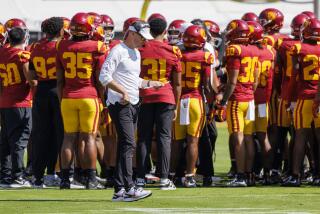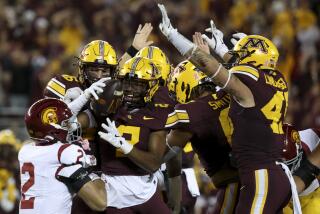USC Is Trying to Hang On to Its Season
- Share via
In the simple mathematics of football, mistakes can add up quickly. It does not take many fumbles and interceptions to equal a defeat, a lesson USC is learning the hard way.
The Trojans have suffered a rash of turnovers this season, eight in the last two games alone. Such missteps arguably cost them the game against Oregon State last Saturday.
“You can take everything and talk about it and analyze it but it all gets down to one issue,” USC Coach Paul Hackett said. “We have to take care of the football in order to put ourselves in position to win.”
Hackett and his players are not panicking, not with a 3-1 record and a No. 18 ranking. But the Trojans also rank last in turnover margin among Pacific 10 Conference teams.
And while they overcame mistakes against lesser opponents in early games, Saturday’s loss suggests they can no longer afford to be so careless now that Pac-10 play has begun.
“It is something that needs to be stopped,” receiver Matt Nickels said. “You have to be conscious that the other team is going to try and knock the ball away.”
And it might get worse because other teams know that USC is having problems. “They’re going to come after us even harder,” Nickels said.
Last season, the Trojans averaged less than one fumble and a little more than one interception a game. And the defense led the nation in takeaways.
This season’s team is arguably more talented, especially with a healthy Carson Palmer at quarterback, but victories have not come easily and each week has brought a new concern.
First it was Palmer looking rusty, then it was consistency and special teams. Now comes the worrisome trend in what coaches refer to as “ball security.”.
The fumbles began to pile up against San Jose State two weeks ago. Receiver Marcell Allmond lost the ball on a controversial play inches short of the end zone. Then it was Palmer’s turn, then tailback Sultan McCullough.
The real killer came against Oregon State. With the score tied and USC backed up against its goal line, short-yardage specialist Petros Papadakis fumbled and Oregon State scored a few plays later.
Papadakis was distraught. Palmer wasn’t much happier after throwing three interceptions.
“That is the most glaring issue here,” Hackett said. “When you turn the ball over four times, one time on the six-yard line, it’s an awful lot to ask of the defense.”
It was all the more frustrating because USC spent last week in practice trying to eliminate turnovers.
Part of the solution is technical. Running backs, for instance, work every day on the proper way to receive handoffs and on keeping the ball close to their bodies as they run.
Part of it is mental. Quarterbacks watch videotape to recognize defenses and direct passes away from double coverage. Coaches talk about down and distance, knowing when to fight for extra yardage and when to cover up.
There is also the old-school method: Any player who turns the ball over can take a seat.
But the Trojans want McCullough to be a workhorse and they want Papadakis in the goal-line offense. Benching Palmer is definitely not a consideration.
The quarterback seemed mystified by his performance against Oregon State, saying: “I felt good all game.”
It has been a roller-coaster season for him. He started poorly against Penn State, then rebounded to complete nearly 70% of his passes for three touchdowns and only one interception in the next two games.
But Palmer has also been prone to forcing passes into tight coverage. And with five touchdowns against five interceptions, he might be too eager to make plays.
“Carson’s harder on himself than anyone else is,” Nickels said. “You don’t have to tell him. He knows when he screws up.”
To some extent, USC’s turnover troubles might be a function of youth. Nearly all the skill players on offense--from Palmer to McCullough to receivers Allmond and Kareem Kelly--are sophomores.
“It comes down to being more focused,” said Zeke Moreno, a senior linebacker. “We have got to learn to be poised in pressure situations.”
Palmer also lacks experience, having started only a dozen games. On one play last week, he was forced from the pocket and threw an ill-advised pass that Oregon State intercepted.
“He’s going to have to go through that a few times,” Hackett said. “He’s going to have to say, ‘Hey, it didn’t work, throw it away and come back on second down.’ ”
This week, with Arizona and its revamped defense coming to the Coliseum on Saturday, Palmer will watch more videotape and the coaches will talk more about ball security.
The running backs will get the worst of it. They will run through a gantlet of teammates trying to strip the ball. They will practice spinning and avoiding the reach of defenders.
For all the attention paid to this problem, the coaches also worry about walking a psychological tightrope.
“You don’t want to make too much of it because they lose their instincts and they don’t run as well,” said Kennedy Pola, the running backs coach. “And you can’t dwell on it too much because you don’t want to leave that negative thought in a player’s mind.”
It may be too late for that. The way things have been going, turnovers are not far from anyone’s thoughts.
“It’s a bad feeling when you fumble,” Papadakis said. “It’s like losing your kid at the mall.”
UP NEXT
ARIZONA
at USC
Saturday
12:30 p.m.
Channel 7
COMING TO GRIPS
Lack of intensity during the first half of games and penalties were on the table for discussion in offense’s players-only meeting. Page 4
DEPTH A POSITIVE
With injured DeShaun Foster out, Jermaine Lewis and Akil Harris had a chance to show what they could do at tailback. Page 4
More to Read
Fight on! Are you a true Trojans fan?
Get our Times of Troy newsletter for USC insights, news and much more.
You may occasionally receive promotional content from the Los Angeles Times.







